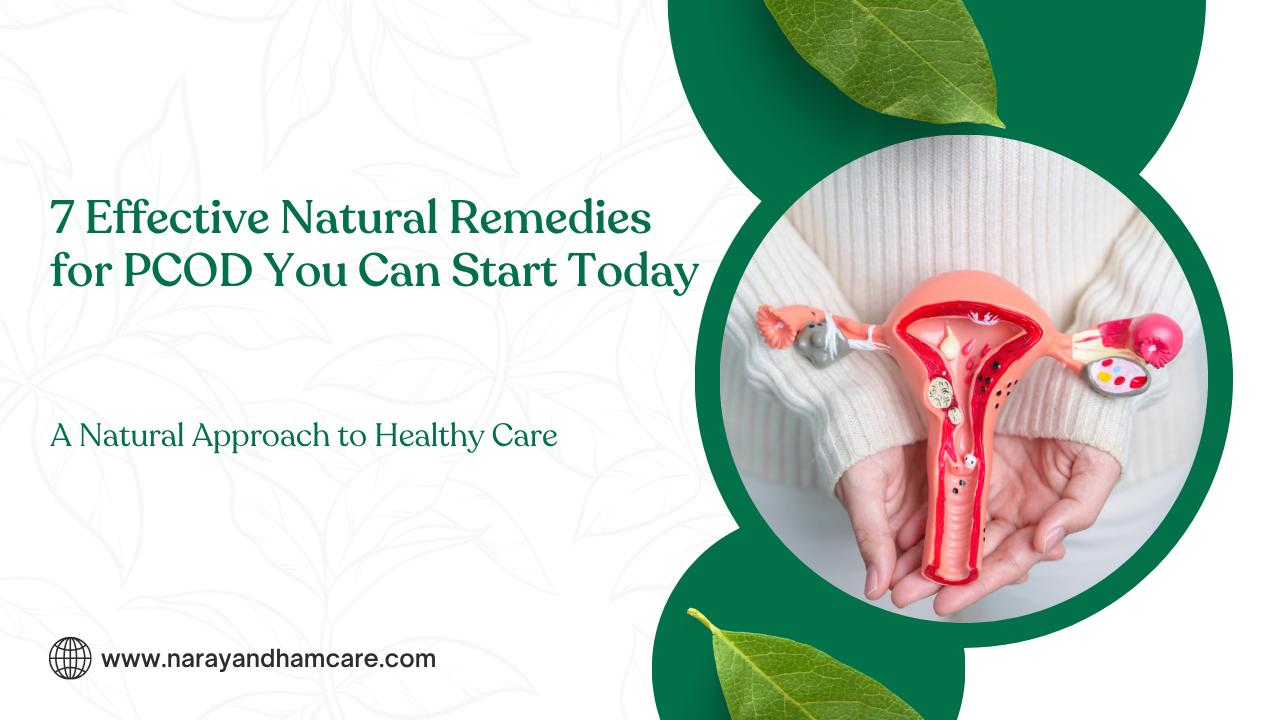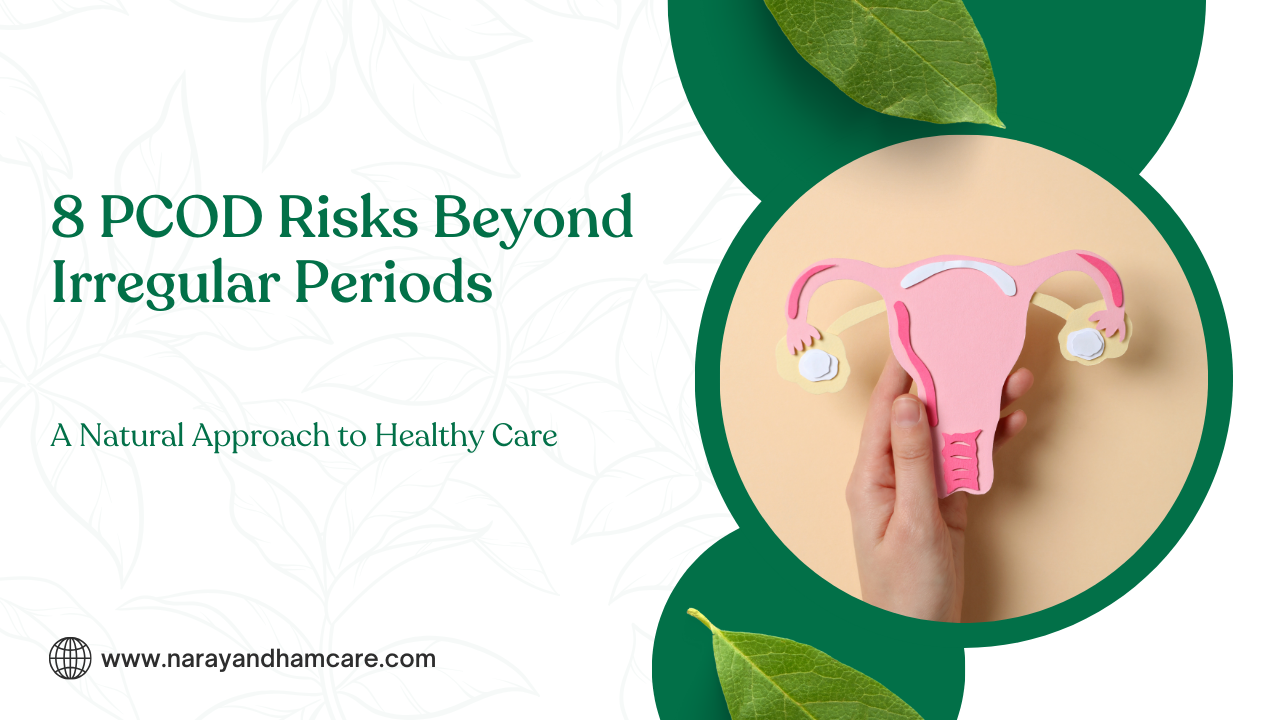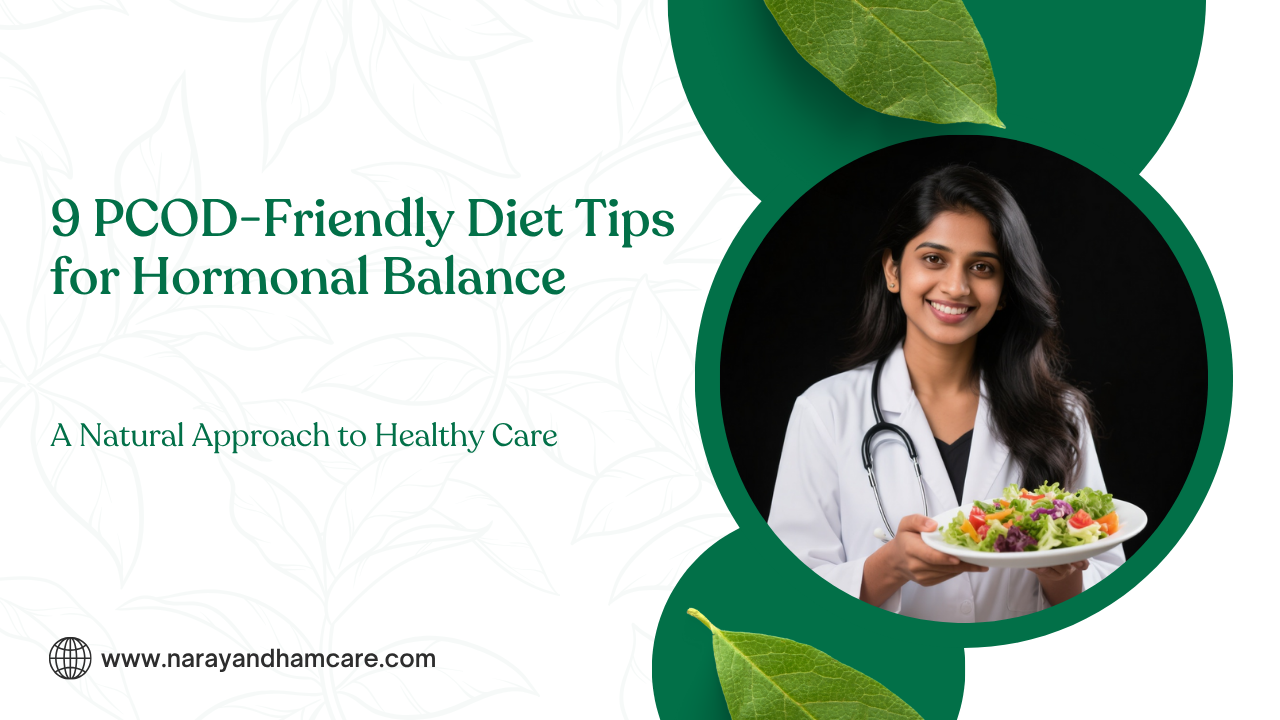Introduction: Taking Charge of Your Hormonal Health
Let’s talk about something that affects millions of women worldwide but isn’t always openly discussed: Polycystic Ovary Syndrome, or PCOD. If you’ve been feeling confused, frustrated, or simply unwell due to your hormones, you’re definitely not alone. PCOD is a common hormonal imbalance that can throw your body out of whack in many ways. But here’s the good news: while there’s no “cure” in the traditional sense, there are many natural ways to manage the symptoms and improve your overall well-being. This blog post will explore 7 effective natural remedies for PCOD that you can start today, empowering you to take charge of your health.
Understanding PCOD and its impact is crucial. It’s not just about irregular periods; it can affect your energy, mood, fertility, and even your skin. Many women feel overwhelmed by the diagnosis, but the truth is, with the right approach, you can significantly improve your quality of life. We’ll delve into simple yet powerful natural solutions that can make a real difference in managing your PCOD symptoms and helping you feel more like yourself again.
Problem: The Silent Struggle with PCOD
The main problem with PCOD is that it’s a complex hormonal disorder that can disrupt various bodily functions. It primarily affects women of reproductive age, though symptoms can appear earlier or later. At its core, PCOD involves an imbalance in reproductive hormones, leading to problems in the ovaries. These problems often include the ovaries not releasing eggs regularly, and instead, developing many small cysts.
This hormonal imbalance can manifest in a wide range of challenging symptoms, making daily life difficult for many. Women with PCOD often experience a silent struggle, dealing with symptoms that can be embarrassing, physically uncomfortable, and emotionally draining. The impact isn’t just physical; it can also affect mental health, leading to anxiety, depression, and low self-esteem. The frustration of not having a “quick fix” can be immense, and many women feel unheard or misunderstood when seeking help. This widespread issue requires a holistic approach, focusing on sustainable lifestyle changes rather than just symptom management.
Symptoms: What to Look Out For
PCOD symptoms can vary from person to person, but here are some of the most common signs that indicate you might be experiencing this hormonal imbalance:
- Irregular Periods: This is one of the most common signs. Your periods might be infrequent, very light, very heavy, or you might miss them altogether. This happens because the ovaries aren’t releasing eggs regularly.
- Excess Androgen (Male Hormone) Levels: This can lead to various physical changes.
- Hirsutism: Excessive body hair growth on the face, chest, back, or abdomen.
- Acne: Persistent and often severe acne, especially on the face, chest, and upper back.
- Hair Thinning/Loss: Male-pattern baldness or thinning hair on the scalp.
- Weight Gain and Difficulty Losing Weight: Many women with PCOD find it very challenging to manage their weight, especially around the abdomen.
- Insulin Resistance: This is a common underlying issue in PCOD where your body’s cells don’t respond well to insulin, leading to higher blood sugar levels. This can contribute to weight gain and increase the risk of type 2 diabetes.
- Fatigue: Feeling constantly tired, even after getting enough sleep.
- Mood Swings, Anxiety, and Depression: Hormonal imbalances can significantly impact mental health, leading to emotional instability.
- Pelvic Pain: Some women experience chronic pelvic pain.
- Sleep Problems: Difficulty falling or staying asleep, or experiencing sleep apnea.
- Darkening of Skin (Acanthosis Nigricans): Dark, velvety patches of skin can appear in body creases like the neck, groin, and armpits.
- Fertility Issues: Difficulty conceiving due to irregular ovulation.
If you’re experiencing several of these symptoms, it’s important to consult a healthcare professional for a proper diagnosis.
Solution: Practical Natural Remedies You Can Start Today
While medical interventions are important for PCOD management, incorporating natural remedies can significantly improve your symptoms and overall health. These solutions are practical, realistic, and easy to follow, empowering you to make positive changes in your daily life.
-
Embrace a Whole Foods Diet: Your Plate is Your Powerhouse
- Focus on: Lean proteins (chicken, fish, legumes), healthy fats (avocado, nuts, seeds), and complex carbohydrates (whole grains, vegetables, fruits).
- Avoid/Limit: Refined sugars, processed foods, white bread, pasta, and sugary drinks. These can spike blood sugar and worsen insulin resistance.
- Why it helps: A balanced diet helps regulate blood sugar, improve insulin sensitivity, and manage weight, all crucial for PCOD. Eating fiber-rich foods helps regulate digestion and hormone elimination.
- Actionable Tip: Start by swapping out one sugary drink a day for water or herbal tea. Gradually increase your vegetable intake at each meal.
-
Regular Physical Activity: Move Your Body, Balance Your Hormones
- Aim for: At least 30 minutes of moderate-intensity exercise most days of the week. This could be brisk walking, jogging, cycling, swimming, or dancing.
- Include: Strength training a few times a week, as building muscle helps improve insulin sensitivity.
- Why it helps: Exercise is a powerful tool for weight management, improving insulin sensitivity, and reducing stress. It can also help regulate your menstrual cycle.
- Actionable Tip: Find an activity you enjoy! If you hate the gym, go for a walk in a park or try a dance class. Consistency is key. Even short bursts of activity add up.
-
Manage Stress Effectively: Calm Your Mind, Calm Your Hormones
- Techniques: Yoga, meditation, deep breathing exercises, spending time in nature, journaling, or engaging in hobbies you love.
- Why it helps: Chronic stress can worsen hormonal imbalances and PCOD symptoms. Reducing stress lowers cortisol levels, which can positively impact insulin and androgen levels.
- Actionable Tip: Dedicate 10-15 minutes each day to a stress-reducing activity. This could be a guided meditation app or simply sitting quietly and focusing on your breath.
-
Prioritize Quality Sleep: Rest for Restoration
- Aim for: 7-9 hours of uninterrupted sleep per night.
- Create a routine: Go to bed and wake up at roughly the same time each day, even on weekends. Make your bedroom dark, quiet, and cool.
- Why it helps: Poor sleep can disrupt hormone regulation, increase insulin resistance, and contribute to weight gain. Quality sleep allows your body to repair and rebalance.
- Actionable Tip: Avoid screens (phones, tablets) for at least an hour before bedtime. Try a calming herbal tea like chamomile before sleep.
-
Supplement Wisely: Targeted Support for Your Body
- Commonly Recommended:
- Inositol (Myo-inositol and D-chiro-inositol): Can improve insulin sensitivity and egg quality.
- Omega-3 Fatty Acids: Anti-inflammatory properties, can help with insulin resistance and mood.
- Vitamin D: Many women with PCOD are deficient. Important for hormone regulation and insulin sensitivity.
- Magnesium: Helps with blood sugar regulation, sleep, and stress.
- Important: Always consult your doctor or a qualified nutritionist before starting any new supplements. They can advise on appropriate dosages and potential interactions.
- Why it helps: Supplements can bridge nutritional gaps and provide targeted support for specific PCOD-related issues.
- Actionable Tip: Discuss these supplements with your healthcare provider to see if they are right for you. Don’t self-prescribe.
- Commonly Recommended:
-
Herbal Allies: Nature’s Pharmacy for Hormonal Balance
- Examples:
- Spearmint Tea: Some studies suggest it can help reduce androgen levels and hirsutism.
- Cinnamon: May help improve insulin sensitivity.
- Licorice Root: Can support adrenal function and potentially regulate hormones (use with caution and under guidance).
- Chasteberry (Vitex): Often used to regulate menstrual cycles and ovulation (best used under professional guidance).
- Caution: Herbal remedies can be powerful and interact with medications. Always consult a qualified herbalist or doctor before using herbs, especially if you are on other medications.
- Why it helps: Many herbs have properties that can help balance hormones, reduce inflammation, and support overall well-being.
- Actionable Tip: If you’re interested in spearmint tea, try having 1-2 cups daily and monitor its effects.
- Examples:
-
Mindful Eating and Hydration: Listen to Your Body
- Mindful Eating: Pay attention to your hunger and fullness cues. Eat slowly, savor your food, and avoid distractions. This can help prevent overeating and improve digestion.
- Hydration: Drink plenty of water throughout the day. Water is essential for all bodily functions, including hormone transport and detoxification.
- Why it helps: Mindful eating fosters a healthier relationship with food, and proper hydration supports metabolic processes crucial for PCOD management.
- Actionable Tip: Keep a water bottle handy and sip throughout the day. Before reaching for a snack, ask yourself if you’re truly hungry or just bored/thirsty.
Frequently Asked Questions (FAQ)
Q1: Can PCOD be cured completely? A1: Currently, there’s no complete “cure” for PCOD. However, it can be effectively managed through lifestyle changes, natural remedies, and, if necessary, medical interventions. Many women successfully alleviate their symptoms and lead healthy lives.
Q2: How long does it take to see results from natural remedies for PCOD? A2: The timeframe for seeing results varies depending on the individual and the consistency of the remedies. Some women may notice improvements in a few weeks, while for others, it might take a few months. Consistency and patience are key.
Q3: Are these natural remedies safe to use with conventional PCOD medications? A3: It is crucial to consult your doctor or a healthcare professional before combining natural remedies with conventional medications. Some remedies can interact with medications, so professional guidance is essential to ensure safety and effectiveness.
Q4: Will I be able to conceive naturally if I have PCOD and follow these remedies? A4: Many women with PCOD who adopt these natural remedies successfully improve their ovulation and fertility. While there’s no guarantee, these approaches significantly increase your chances of natural conception by addressing the underlying hormonal imbalances.
Q5: Is dairy bad for PCOD? A5: For some women with PCOD, dairy might exacerbate symptoms due to its potential to increase insulin-like growth factor 1 (IGF-1), which can worsen acne and insulin resistance. It’s often recommended to try an elimination diet to see if dairy affects your symptoms. However, this is not universally true for everyone with PCOD.
Conclusion: Your Journey to Hormonal Harmony
Navigating PCOD can feel like a marathon, not a sprint. But by incorporating these 7 effective natural remedies into your daily routine, you’re not just managing symptoms; you’re actively working towards hormonal harmony and overall well-being. Remember, small, consistent changes can lead to significant improvements over time.
Don’t feel overwhelmed by trying to do everything at once. Pick one or two remedies that resonate with you and start there. Celebrate every small victory – whether it’s choosing a healthy meal, going for a walk, or simply getting a good night’s sleep. Your body is incredibly resilient, and with the right support, it can find its balance.
We encourage you to embark on this journey with a positive mindset, patience, and the understanding that you are empowered to make a difference in your health. Share your experiences in the comments below – your insights could inspire and help others on their PCOD journey!





